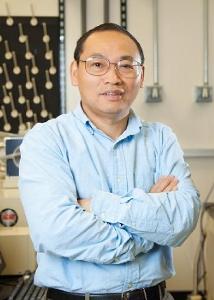Dec 12 2013
A University of Houston physicist has been honored with the Edith and Peter O'Donnell Award in Science from The Academy of Medicine, Engineering & Science of Texas (TAMEST).
 University of Houston physicist Zhifeng Ren has been honored with the 2014 Edith and Peter O'Donnell Award in Science from The Academy of Medicine, Engineering & Science of Texas (TAMEST).Credit: University of Houston
University of Houston physicist Zhifeng Ren has been honored with the 2014 Edith and Peter O'Donnell Award in Science from The Academy of Medicine, Engineering & Science of Texas (TAMEST).Credit: University of Houston
Zhifeng Ren, M.D. Anderson Chair Professor of Physics and principal investigator at the Texas Center for Superconductivity, is one of four Texas researchers selected for the 2014 O'Donnell Awards.
The O'Donnell Awards were established in 2005 to recognize Texas' most promising researchers, whose work is judged by professional performance, creativity and resourcefulness. They will be formally presented on Jan. 16 at TAMEST's annual conference at the Hyatt Lost Pines Resort near Austin.
Ren was cited for making seminal contributions in five scientific fields: carbon nanotubes, thermoelectrics, hierarchical zinc oxide nanowires, high temperature superconductivity, and molecule delivery/sensing. He was the first to grow aligned carbon nanotube arrays in large scale, to make nanostructured bulk thermoelectric materials with much improved properties, and to synthesize hierarchical zinc oxide nanowires.
He also was named Tuesday as a fellow in the 2013 Class of the National Academy of Inventors.
"Dr. Ren's innovative research serves as an admirable example of what we are striving to do here at the University of Houston," said UH President Renu Khator. "This groundbreaking work can be used to improve lives in Texas and around the world. His recognition by The Academy of Medicine, Engineering and Science of Texas is both gratifying and well-deserved."
Success in science, Ren said, requires a mix of intelligence and persistence.
"You don't want to be a 100-meter dash person," he said. "You have to be persistent. Of course, you have to have intelligence. If you aren't smart enough, it doesn't matter how persistent you are."
Ren, who was recruited to UH from Boston College in 2012, has displayed a persistence that has allowed him to flourish in a wide range of fields, reflecting a curiosity that Paul Chu, founding director of the Texas Center for Superconductivity at UH, said is common to all scientists who make a lasting impact.
"It's his curiosity and his energy, and the out-of-the-box thinking," Chu said. "He's an excellent entrepreneur and a humanist."
Ren's current interests include energy efficiency and nanomedicine.
He has received wide recognition for his work in thermoelectric materials; a paper published earlier this year in the Proceedings of the National Academy of Sciences reported an innovation using non-toxic materials – tin telluride, with the addition of a tiny amount of the chemical element indium – to build a device for waste heat recovery that could boost vehicle mileage as much as 5 percent, and power plant and industrial processing performance as much as 10 percent.
He also is working on a project to use nanosensors to detect the level of immunosuppressant medications in a patient's bloodstream, allowing post-transplant patients to personalize, and potentially lower, the amount of medications they are required to take.
Ren said the O'Donnell Award offers both recognition of his work and an incentive to continue pressing for more results.
"I really appreciate it," he said. "It's very important to me. Every time you get something, it puts more pressure on you. I feel I have to work harder now."
The other 2014 O'Donnell Award winners include Richard Bruick, associate professor of biochemistry at the University of Texas Southwestern Medical Center, in the category of medicine; Thomas Truskett, Les and Sherri Stuewer Endowed Professor and Bill L. Stanley Leadership Chair in the McKetta Department of Chemical Engineering at the University of Texas at Austin in engineering, and James Walker, institute scientist at Southwest Research Institute, in technology innovation.
E. Linn Draper Jr., president of TAMEST's board of directors, said the 2014 O'Donnell Awards acknowledge the achievements of researchers whose work has implications across a range of scientific disciplines.
"Primarily focused on medicine and physics, our award recipients conducted cutting-edge research in areas that will improve the health of our citizens, advance our materials engineering technologies and protect personnel in the armed forces and space program," Draper said.